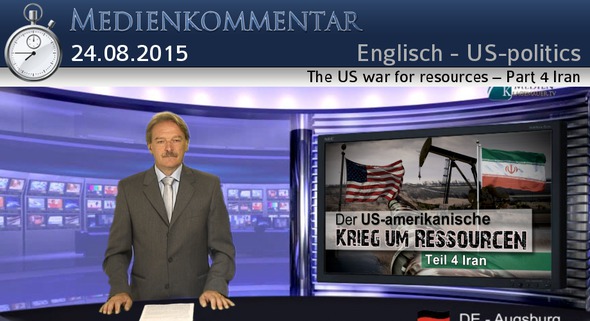Politics (English)
The US war for resources – Part 4 Iran
24.08.2015
Subtitle "Afrikaans" was produced by machine.Subtitle "አማርኛ" was produced by machine.Subtitle "العربية " was produced by machine.Subtitle "Ārāmāyâ" was produced by machine.Subtitle "azərbaycan dili " was produced by machine.Subtitle "беларуская мова " was produced by machine.Подзаглавието "България" е създадено от машина.সাবটাইটেল "বাংলা " মেশিন দ্বারা তৈরি করা হয়েছিল।Subtitle "བོད་ཡིག" was produced by machine.Subtitle "босански" was produced by machine.Subtitle "català" was produced by machine.Subtitle "Cebuano" was produced by machine.Subtitle "ગુજરાતી" was produced by machine.Subtitle "corsu" was produced by machine.Podtitul "Čeština" byl vytvořen automaticky.Subtitle "Cymraeg" was produced by machine.Subtitle "Dansk" was produced by machine.Untertitel "Deutsch" wurde maschinell erzeugt.Subtitle "Untertitel" was produced by machine.Ο υπότιτλος "Ελληνικά" δημιουργήθηκε αυτόματα.Subtitle "English" was produced by machine.Subtitle "Esperanto" was produced by machine.El subtítulo "Español" se generó automáticamente.Subtitle "Eesti" was produced by machine.Subtitle "euskara" was produced by machine.Subtitle "فارسی" was produced by machine.Subtitle "Suomi" was produced by machine.Le sous-titrage "Français" a été généré automatiquement.Subtitle "Frysk" was produced by machine.Subtitle "Gaeilge" was produced by machine.Subtitle "Gàidhlig" was produced by machine.Subtitle "Galego" was produced by machine.Subtitle "Schwizerdütsch" was produced by machine.Subtitle "هَوُسَ" was produced by machine.Subtitle "Ōlelo Hawaiʻi" was produced by machine.Subtitle "עברית" was produced by machine.Subtitle "हिन्दी" was produced by machine.Subtitle "Mẹo" was produced by machine.Podnaslov "Hrvatski" generiran je automatski.Subtitle "Kreyòl ayisyen " was produced by machine.Subtitle "Magyar" was produced by machine.Subtitle "Հայերեն" was produced by machine.Subtitle "Bahasa Indonesia " was produced by machine.Subtitle "Asụsụ Igbo " was produced by machine.Textun"Íslenska" var framkvæmt vélrænt.Sottotitoli "Italiano" sono stati generati con l'intelligenza artificiale.字幕は"日本語" 自動的に生成されました。Subtitle "Basa Jawa" was produced by machine.Subtitle "ქართული" was produced by machine.Subtitle "қазақ тілі " was produced by machine.Subtitle "ភាសាខ្មែរ" was produced by machine.Subtitle "ಕನ್ನಡ" was produced by machine.Subtitle "한국어" was produced by machine.Subtitle "कोंकणी語" was produced by machine.Subtitle "کوردی" was produced by machine.Subtitle "Кыргызча" was produced by machine.Subtitle " lingua latina" was produced by machine.Subtitle "Lëtzebuergesch" was produced by machine.Subtitle "Lingala" was produced by machine.Subtitle "ພາສາ" was produced by machine.Antraštė "Lietuvių" buvo sukurta mašina.Subtitle "Latviešu" was produced by machine.Subtitle "fiteny malagasy" was produced by machine.Subtitle "te reo Māori" was produced by machine.Subtitle "македонски јазик" was produced by machine.Subtitle "malayāḷaṁ" was produced by machine.Subtitle "Монгол хэл" was produced by machine.Subtitle "मराठी" was produced by machine.Subtitle "Bahasa Malaysia" was produced by machine.Subtitle "Malti" was produced by machine.Subtitle "မြန်မာစာ " was produced by machine.Subtitle "नेपाली" was produced by machine.Ondertitels "Nederlands" machinaal geproduceerd.Subtitle "Norsk" was produced by machine.Subtitle "chiCheŵa" was produced by machine.Subtitle "ਪੰਜਾਬੀ" was produced by machine.Podtytuł "Polska" został utworzony przez maszynę.Subtitle "پښتو" was produced by machine.Legenda "Português" foi gerada automaticamente.Subtitle "Română" was produced by machine.Subtitle "Язык жестов (Русский)" was produced by machine.Субтитры "Pусский" были созданы машиной.Subtitle "Kinyarwanda" was produced by machine.Subtitle "सिन्धी" was produced by machine.Subtitle "Deutschschweizer Gebärdensprache" was produced by machine.Subtitle "සිංහල" was produced by machine.Subtitle "Slovensky" was produced by machine.Subtitle "Slovenski" was produced by machine.Subtitle "gagana fa'a Samoa" was produced by machine.Subtitle "chiShona" was produced by machine.Subtitle "Soomaaliga" was produced by machine.Titra "Shqip" u krijua automatikisht.Превод "србски" је урађен машински.Subtitle "Sesotho" was produced by machine.Subtitle "Basa Sunda" was produced by machine.Undertext "Svenska" är maskinell skapad.Subtitle "Kiswahili" was produced by machine.Subtitle "தமிழ்" was produced by machine.Subtitle "తెలుగు" was produced by machine.Subtitle "Тоҷикй" was produced by machine.Subtitle "ภาษาไทย" was produced by machine.ንኡስ ኣርእስቲ "ትግርኛ" ብማሽን እዩ ተፈሪዩ።Subtitle "Türkmençe" was produced by machine.Subtitle "Tagalog" ay nabuo sa pamamagitan ng makina.Altyazı "Türkçe" otomatik olarak oluşturuldu.Subtitle "татар теле" was produced by machine.Subtitle "Українська " was produced by machine.ذیلی عنوان "اردو" مشین کے ذریعہ تیار کیا گیا تھا۔Subtitle "Oʻzbek" was produced by machine.Phụ đề được tạo bởi máy.Subtitle "Serbšćina" was produced by machine.Subtitle "isiXhosa" was produced by machine.Subtitle "ייִדיש" was produced by machine.Subtitle "Yorùbá" was produced by machine.Subtitle "中文" was produced by machine.Subtitle "isiZulu" was produced by machine.
kla.TV accepts no liability for defective translation.kla.TV accepts no liability for defective translation.kla.TV accepts no liability for defective translation.kla.TV accepts no liability for defective translation.kla.TV accepts no liability for defective translation.kla.TV accepts no liability for defective translation.kla.TV не носи отговорност за некачествен превод.অপর্যাপ্ত অনুবাদের জন্য kla.TV কোন দায় বহন করে না।kla.TV accepts no liability for defective translation.kla.TV accepts no liability for defective translation.kla.TV accepts no liability for defective translation.kla.TV accepts no liability for defective translation.kla.TV accepts no liability for defective translation.kla.TV accepts no liability for defective translation.kla.TV nenese žádnou odpovědnost za chybné překlady.kla.TV accepts no liability for defective translation.kla.TV accepts no liability for defective translation.kla.TV übernimmt keine Haftung für mangelhafte Übersetzung.kla.TV accepts no liability for inadequate translationΗ kla.TV δεν φέρει καμία ευθύνη για ανεπαρκή μετάφραση.kla.TV accepts no liability for defective translation.kla.TV accepts no liability for defective translation.kla.TV no se hace responsable de traducciones incorrectas.kla.TV accepts no liability for defective translation.kla.TV accepts no liability for defective translation.kla.TV accepts no liability for defective translation.kla.TV accepts no liability for defective translation.kla.TV n'assume aucune responsabilité en cas de mauvaise traduction.kla.TV accepts no liability for defective translation.kla.TV accepts no liability for defective translation.kla.TV accepts no liability for defective translation.kla.TV accepts no liability for defective translation.kla.TV accepts no liability for defective translation.kla.TV accepts no liability for defective translation.kla.TV accepts no liability for defective translation.kla.TV accepts no liability for defective translation.kla.TV accepts no liability for defective translation.kla.TV accepts no liability for defective translation.kla.TV ne preuzima nikakvu odgovornost za neadekvatne prijevode.kla.TV accepts no liability for defective translation.kla.TV nem vállal felelősséget a hibás fordításértkla.TV accepts no liability for defective translation.kla.TV accepts no liability for defective translation.kla.TV accepts no liability for defective translation.kla.TV tekur enga ábyrgð á áræðanleika þýðingarinnarKla.TV non si assume alcuna responsabilità per traduzioni lacunose e/o errate.Kla.TV は、不適切な翻訳に対して一切の責任を負いません。kla.TV accepts no liability for defective translation.kla.TV accepts no liability for defective translation.kla.TV accepts no liability for defective translation.kla.TV accepts no liability for defective translation.kla.TV accepts no liability for defective translation.kla.TV accepts no liability for defective translation.kla.TV accepts no liability for defective translation.kla.TV accepts no liability for defective translation.kla.TV accepts no liability for defective translation.kla.TV accepts no liability for defective translation.kla.TV accepts no liability for defective translation.kla.TV accepts no liability for defective translation.kla.TV accepts no liability for defective translation.kla.TV neprisiima jokios atsakomybės už netinkamą vertimą.kla.TV accepts no liability for defective translation.kla.TV accepts no liability for defective translation.kla.TV accepts no liability for defective translation.kla.TV accepts no liability for defective translation.kla.TV accepts no liability for defective translation.kla.TV accepts no liability for defective translation.kla.TV accepts no liability for defective translation.kla.TV accepts no liability for defective translation.kla.TV accepts no liability for defective translation.kla.TV accepts no liability for defective translation.kla.TV accepts no liability for defective translation.kla.TV aanvaardt geen aansprakelijkheid voor foutieve vertalingen.kla.TV accepts no liability for defective translation.kla.TV accepts no liability for defective translation.kla.TV accepts no liability for defective translation.kla.TV nie ponosi odpowiedzialności za wadliwe tłumaczenie.kla.TV accepts no liability for defective translation.kla.TV não se responsabiliza por traduções defeituosas.kla.TV accepts no liability for defective translation.kla.TV accepts no liability for defective translation.kla.TV не несет ответственности за некачественный перевод.kla.TV accepts no liability for defective translation.kla.TV accepts no liability for defective translation.kla.TV accepts no liability for defective translation.kla.TV accepts no liability for defective translation.kla.TV accepts no liability for defective translation.kla.TV accepts no liability for defective translation.kla.TV accepts no liability for defective translation.kla.TV accepts no liability for defective translation.kla.TV accepts no liability for defective translation.kla.TV nuk mban asnjë përgjegjësi për përkthime joadekuate.kla.TV не преузима никакву одговорност за неадекватне преводе..kla.TV accepts no liability for defective translation.kla.TV accepts no liability for defective translation.Kla.TV tar inget ansvar för felaktiga översättningar.kla.TV accepts no liability for defective translation.kla.TV accepts no liability for defective translation.kla.TV accepts no liability for defective translation.kla.TV accepts no liability for defective translation.kla.TV accepts no liability for defective translation.kla.TV ንዝኾነ ጉድለት ትርጉም ዝኾነ ይኹን ሓላፍነት ኣይቅበልን እዩ።kla.TV accepts no liability for defective translation.kla. Walang pananagutan ang TV sa mga depektibong pagsasalin.kla.TV hatalı çeviriler için hiçbir sorumluluk kabul etmez.kla.TV accepts no liability for defective translation.kla.TV accepts no liability for defective translation.kla.TV عیب دار ترجمہ کے لیے کوئی ذمہ داری قبول نہیں کرتا ہے۔kla.TV accepts no liability for defective translation.Kla. TV không chịu trách nhiệm về bản dịch không đầy đủ.kla.TV accepts no liability for defective translation.kla.TV accepts no liability for defective translation.kla.TV accepts no liability for defective translation.kla.TV accepts no liability for defective translation.kla.TV accepts no liability for defective translation.kla.TV accepts no liability for defective translation.
The US war for resources – Part 4 Iran
24.08.2015
www.kla.tv/6569
It is known that control over raw materials, especially oil, is decisive for worldwide dominance.
In today’s broadcast another country, Iran is to be examined more closely from this viewpoint.
[continue reading]
The US war for resources – Part 4 Iran
Download broadcast and attachments in the wanted quality:
Hashtags:
Useage rights:
Standard-Kla.TV-Licence

 Deutsch-ID setzten
Deutsch-ID setzten



Sendungstext
herunterladen
24.08.2015 | www.kla.tv/6569
Dear viewers, welcome to part 4 of our series „The United State’s war for resources“. In Part 1 we reported on how the strategy of the USA has been oriented towards the global resources for decades. It is known that control over raw materials, especially oil, is decisive for worldwide dominance. Part 2 shed light on how the trouble spots concerning Russia and Greece might be correlated to that. In today’s broadcast another country, Iran is to be examined more closely from this viewpoint. Iran's geopolitical circumstances and the natural resources alone should make it clear enough for everyone that all this demonization of Iran, the sanctions and the power play about the nuclear agreement, can be nothing else than a US war for resources. Let's look at some facts here: 1. Natural resources: Iran owns the largest natural gas resources. It owns –depending on the source - the third or fourth biggest oil stocks worldwide. Iran has a high influence on the world’s supply of fossil energy sources, as well. 2. The geopolitical location: Iran is located between the Caspian Sea, the Persian Gulf and especially the Straits of Hormus. Geostrategically a highly important area with a long history, reaching far back into ancient times. The Straits of Hormus connects the Persian Gulf with the gulf of Oman in the West, and with the Arabian Sea and the Indian Ocean in the East. The entire shipping traffic, to and from the oil ports of Kuwait, Katar, Bahrain, Iraq, the United Arab Emirates and Iran, runs through this passage. Since a blocking of the Straits of Hormus would block the deliveries of important parts of the oil-producing areas in the Middle East, this passage is of worldwide strategic significance. While taking this passage, ships cross the territorial waters of Oman and Iran. Now, Iran and the United States signed the Geneva Conventions on the Law of the Sea of 1958. This convention gives ships the right to peacefully cross the Straits of Hormus. All warships however must seek Iran’s permission before crossing. The USA however go on letting their warships pass the Straits of Hormus without registration - claiming the rights due to their habit having always used the straits. Let 's have a short historic review on how the US-war for Iran's resources reveals itself: - In 1951 Iran’s oil industry was nationalized because the British Anglo-Iranian Oil Company strictly refused to share half of their oil-business profits with Iran. Consequently Iranian oil was internationally boycotted, foremost by the USA and Great Britain. - In 1953 the Iranian Prime Minister was overthrown in the so-called operation Ajax by the CIA and the British MI6 Secret Service. He was replaced by the pro-western Shah who gave Great Britain and the USA access to the oil. - After the Islamic revolution in 1979 the pro-western Shah was overthrown and an Islamic regime emerged with Ayatollah Khomeini setting himself as leader of Iran. Since this key event the influence of the USA on Iran has been limited. - In 1980 Washington then supported the Iraqi dictator Saddam Hussein who instigated a war against Iran. As bestseller-author Peter Scholl-Latour presumed, Iraq wanted access to Iranian oil and the Iranian Islamic regime was to be overthrown. Hussein would have been defeated by Iran much earlier in the 9 year Iran-Iraq-war, if he hadn’t been supported by the USA. Amongst others they delivered the poison gas which was used against the Iranians. - Already in the beginning of the mid 1990's Israel started to speak of an “Iranian nuclear threat” in the USA. This contradicts the statement of Israeli “secret service minister” Yuval Steinitz who published in an article on October 19, 2014, that the Iranian nuclear program in 2003 was supposedly in an embryonic state. Lets mention further - that Iran signed the Nuclear non-proliferation-treaty which grants it the right to use nuclear energy for civil purposes only. Our broadcast from July 18, 2015 already explained why Iran does not have any interest in a nuclear bomb. – Inspite of this Iran was still caught in an endless crossfire of being called a "nuclear threat”. On February 10, 2010 president Barack Obama announced extensive sanctions against Iran. In 2012 economic sanctions by the European Union followed, which were directed against (amongst others) the oil industry and the Central Bank of Iran. Since the US-government now faced the fact that Iran bypassed the economic sanctions to a great extent via Russia and China it finally came to a nuclear agreement with Iran in July 2015. Still not approved by the US-Congress. Experts suppose that the west doesn’t want to completely lose Iran with its huge amounts of oil and gas reserves to the east, especially to China, Russia and India. The other thing is that Europe is looking for alternatives as Russia is to be driven from the European market. Further, easing the sanctions against Iran would have an effect on the oil price. It would lead to lower oil prices due to a broader offer. And this in turn would hurt Russia and lead to a loss of billions in their state income. You see, ladies and gentlemen everything is about oil and other resources – and the USA is the puppeteer in this, can hardly be denied. That’s why it’s instructive to view the trouble spots in Russia, Greece or Iran and other developments in this world from this perspective. Stay tuned. Good-bye.
from dd.
https://de.wikipedia.org/wiki/Iran
https://de.wikipedia.org/wiki/Stra%C3%9Fe_von_Hormus
http://www.schweizerzeit.ch/cms/index.php?page=/news/geopolitisches_tauziehen_um_den_iran-2333
https://de.wikipedia.org/wiki/Operation_Ajax
http://www.neopresse.com/politik/naherosten/obama-will-den-iran-deal/